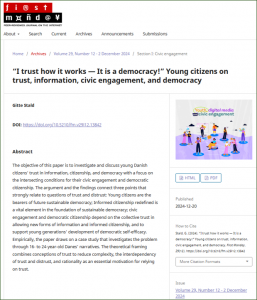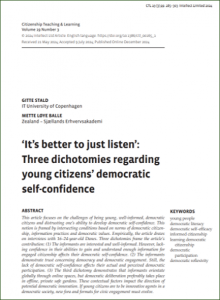Two new articles published
December 2024 turned out to be productive - or rather, to present outcomes of my productivity 🙂
“I trust how it works — It is a democracy!” Young citizens on trust, information, civic engagement, and democracy
Author: Gitte Stald
Abstract
 The objective of this paper is to investigate and discuss young Danish citizens' trust in information, citizenship, and democracy with a focus on the intersecting conditions for their civic engagement and democratic citizenship. The argument and the findings connect three points that strongly relate to questions of trust and distrust: Young citizens are the bearers of future sustainable democracy; Informed citizenship redefined is a vital element in the foundation of sustainable democracy; civic engagement and democratic citizenship depend on the collective trust in allowing new forms of information and informed citizenship, and to support young generations' development of democratic self-efficacy. Empirically, the paper draws on a case study that investigates the problem through 16- to 24-year-old Danes' narratives. The theoretical framing combines conceptions of trust to reduce complexity, the interdependency of trust and distrust, and rationality as an essential motivation for relying on trust.
The objective of this paper is to investigate and discuss young Danish citizens' trust in information, citizenship, and democracy with a focus on the intersecting conditions for their civic engagement and democratic citizenship. The argument and the findings connect three points that strongly relate to questions of trust and distrust: Young citizens are the bearers of future sustainable democracy; Informed citizenship redefined is a vital element in the foundation of sustainable democracy; civic engagement and democratic citizenship depend on the collective trust in allowing new forms of information and informed citizenship, and to support young generations' development of democratic self-efficacy. Empirically, the paper draws on a case study that investigates the problem through 16- to 24-year-old Danes' narratives. The theoretical framing combines conceptions of trust to reduce complexity, the interdependency of trust and distrust, and rationality as an essential motivation for relying on trust.
DOI: https://doi.org/10.5210/fm.v29i12.13842
----------------
And this article which I authored together with Mette Løye Balle through a very good and productive collaboration 🙂
‘It’s better to just listen’: Three dichotomies regarding young citizens’ democratic self-confidence
Authors: Gitte Stald and Mette Løye Balle
Abstract
 This article focuses on the challenges of being young, well-informed, democratic citizens and distrusting one’s ability to develop democratic self-confidence. This notion is framed by intersecting conditions based on norms of democratic citizenship, information practices and democratic values. Empirically, the article draws on interviews with 16–24-year-old Danes. Three dichotomies frame the article’s contribution: (1) The informants are interested and well-informed. However, lacking confidence in their abilities to gain and understand enough information for engaged citizenship affects their democratic self-confidence. (2) The informants demonstrate trust concerning democracy and democratic engagement. Still, the lack of democratic self-confidence affects their actual and perceived democratic participation. (3) The third dichotomy demonstrates that informants orientate globally through online spaces, but democratic deliberation preferably takes place in offline, private safe gardens. These contextual factors impact the direction of potential democratic innovation. If young citizens are to be innovative agents in a democratic society, new fora and formats for civic engagement must evolve.
This article focuses on the challenges of being young, well-informed, democratic citizens and distrusting one’s ability to develop democratic self-confidence. This notion is framed by intersecting conditions based on norms of democratic citizenship, information practices and democratic values. Empirically, the article draws on interviews with 16–24-year-old Danes. Three dichotomies frame the article’s contribution: (1) The informants are interested and well-informed. However, lacking confidence in their abilities to gain and understand enough information for engaged citizenship affects their democratic self-confidence. (2) The informants demonstrate trust concerning democracy and democratic engagement. Still, the lack of democratic self-confidence affects their actual and perceived democratic participation. (3) The third dichotomy demonstrates that informants orientate globally through online spaces, but democratic deliberation preferably takes place in offline, private safe gardens. These contextual factors impact the direction of potential democratic innovation. If young citizens are to be innovative agents in a democratic society, new fora and formats for civic engagement must evolve.

